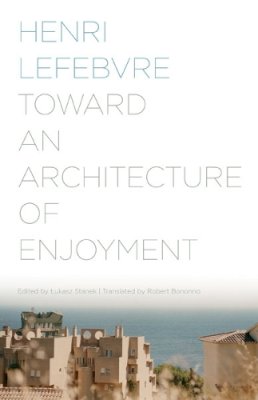5%OFF
Stock image for illustration purposes only - book cover, edition or condition may vary.
Toward an Architecture of Enjoyment
Henri Lefebvre
FREE Delivery in Ireland
Description for Toward an Architecture of Enjoyment
Paperback. Editor(s): Stanek, Lukasz. Translator(s): Bononno, Robert. Num Pages: 248 pages, 22 black & white illustrations. BIC Classification: AMA. Category: (G) General (US: Trade). Dimension: 216 x 143 x 15. Weight in Grams: 312.
Toward an Architecture of Enjoyment is the first publication in any language of the only book devoted to architecture by Henri Lefebvre. Written in 1973 but only recently discovered in a private archive, this work extends Lefebvre’s influential theory of urban space to the question of architecture. Taking the practices and perspective of habitation as his starting place, Lefebvre redefines architecture as a mode of imagination rather than a specialized process or a collection of monuments. He calls for an architecture of jouissance—of pleasure or enjoyment—centered on the body and its rhythms and based on the possibilities of the senses.
Examining ... Read morearchitectural examples from the Renaissance to the postwar period, Lefebvre investigates the bodily pleasures of moving in and around buildings and monuments, urban spaces, and gardens and landscapes. He argues that areas dedicated to enjoyment, sensuality, and desire are important sites for a society passing beyond industrial modernization.
Lefebvre’s theories on space and urbanization fundamentally reshaped the way we understand cities. Toward an Architecture of Enjoyment promises a similar impact on how we think about, and live within, architecture.
Show Less
Product Details
Publisher
University of Minnesota Press
Place of Publication
Minnesota, United States
Shipping Time
Usually ships in 4 to 8 working days
About Henri Lefebvre
Henri Lefebvre (1901–1991) was a Marxist philosopher and sociologist. His many books include The Right to the City, The Production of Space, Everyday Life in the Modern World, and The Urban Revolution (Minnesota, 2003). Łukasz Stanek is lecturer at the Manchester Architecture Centre, University of Manchester, and the author of Henri Lefebvre on Space: Architecture, Urban Research, and the Production of Theory (Minnesota, 2011). Robert ... Read moreBononno, a teacher and translator, lives in New York City. His recent translations include Speech Begins after Death by Michel Foucault (Minnesota, 2013) and Cosmopolitics I and II by Isabelle Stengers (Minnesota, 2010–11). Show Less
Reviews for Toward an Architecture of Enjoyment
"Stanek's work has already taken scholarship on Henri Lefebvre’s concept of space to an unprecedented level of philosophical sophistication. With the discovery of this new text, Stanek escorts Lefebvre to the center of architecture theory since 1968. Lefebvre’s conceptual text and Stanek’s exquisite Introduction together enable the possibility of thinking not about architecture, but thinking architecturally about how we inhabit our world. Toward an ... Read moreArchitecture of Enjoyment takes us toward a concept of the architectural imagination that is a powerful mediator between thought and action."—K. Michael Hays, Harvard Graduate School of Design "We finally have access to [Henri Lefebvre’s] most forceful meditation on the spatial utopia he aspired to. We owe the rescue and publication of this notable book to the perseverance and talent of Łukasz Stanek, who wrote the volume’s excellent and comprehensive introduction."—Environment & Planning D: Society and Space "A work that is profound, relevant, and important."—Canadian Journal of Sociology "This book, which focuses on architecture and redefines it. . . according to Lefebvre, architecture should work towards enjoyment and against aestheticism."—Finnish Architectural Review "Toward an Architecture of Enjoyment not only provides critical insight into Lefebvre, whose impact is still palpable, but reveals new connections between his ideas and design and, ultimately, capitalism and the built environment."—Buildings & Landscapes Show Less

